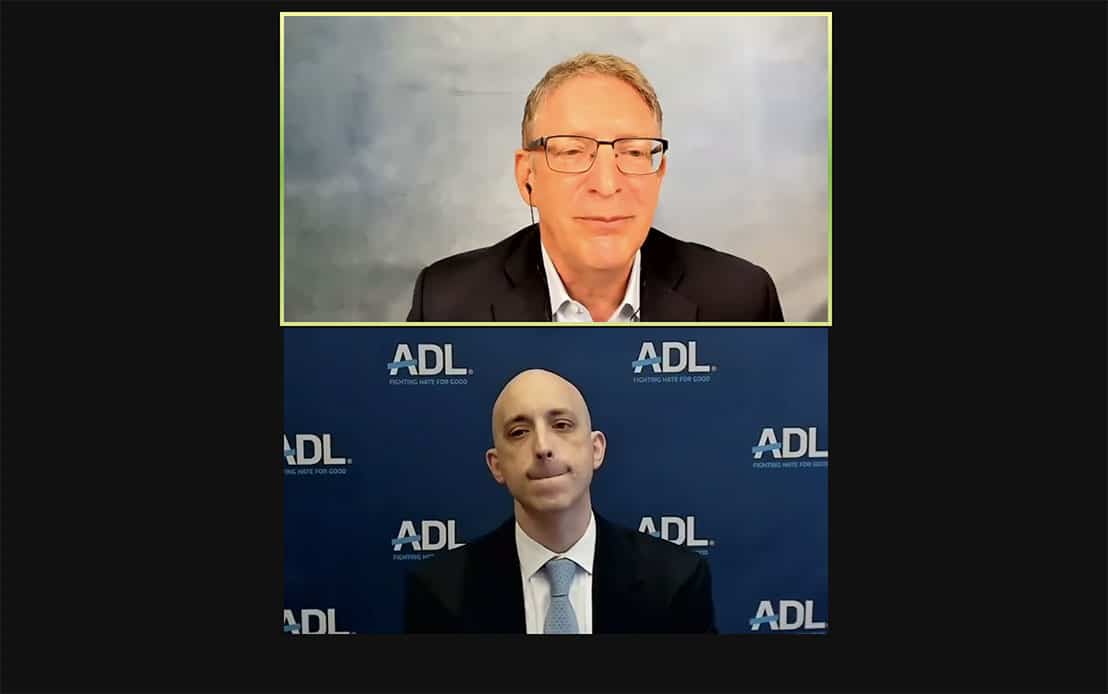 Screenshot from webinar
Screenshot from webinar Anti-Defamation League (ADL) CEO Jonathan Greenblatt provided a “State of Hate” address in a webinar with American Jewish University President Dr. Jeffrey Herbst on June 3 discussing the recent rise in antisemitism.
Greenblatt said that antisemitism seems to have been normalized over the past five years, pointing to the fact that there had been a 15-year decline in antisemitism prior to 2016; that year, the number of antisemitic incidents “jumped” and led a 57% increase in 2017. Greenblatt said it was the largest single-year increase the ADL has ever recorded. 2019 saw a 12% increase in incidents from the year prior and the total number of incidents in 2019 was the highest amount that ADL has ever recorded.
In 2020, the number of antisemitic incidents declined by 4%–which the ADL expected as a result of the COVID-19 pandemic–but “it was still the third highest total we’ve ever seen,” Greenblatt said, adding that there’s “kind of a new normal” regarding antisemitism.
Greenblatt attributed the rise in antisemitism in part due to the “emboldenment of extremists” because leaders ignore “acts of hate.” He said that far-right extremists had become “energized” due to encouragement former President Donald Trump, pointing to statements like telling the Proud Boys to “stand back and stand by.” However, Greenblatt said that “prejudice doesn’t have a political affiliation. It can show up anywhere.” He highlighted the recent assault of Jewish two men in front of Sushi Fumi in the Beverly Grove area as an example.
“They [the perpetrators] weren’t wearing MAGA [Make America Great Again] hats. They weren’t waving Trump 2024 flags. They were waving Palestinian flags,” Greenblatt said.
He said that while this doesn’t mean that anyone who supports Palestinian rights is antisemitic, it is dangerous when “slanderous” assertions that “Israel is committing genocide” are promulgated. “Unhinged people will be motivated by unhinged claims. And that’s what happened here.”
Greenblatt said that members of “The Squad” in Congress aren’t the only ones to blame for such rhetoric, as leaders in the corporate, university and academic world need to condemn antisemitism “full stop” without any qualifiers on the Middle East peace process. “You should be able to say assaulting Jewish people is wrong. Period. End of sentence, end of statement.” He pointed to how people unequivocally condemned anti-Asian hate and Islamophobia without any qualifiers about how they also condemn the Chinese government’s treatment of Uyghur Muslims and Saudi Arabia’s treatment of women.
Greenblatt also criticized university leaders for lacking a spine when it comes to denouncing antisemitism, pointing to Rutgers University-New Brunswick walking back their statement condemning antisemitism as embarrassing and “shameful.” He criticized universities for allowing anti-Israel hate to “fester” into antisemitism and called on universities to ensure that debates over the Israeli-Palestinian conflict are held in a responsible manner.
Greenblatt referred to The New York Times front page spread showing the more than 60 Palestinian children who died in the Gaza Strip during the recent escalation between Israel and Hamas, saying that he has had a back-and-forth with the Times’ publisher over the matter. “In some ways I applaud the effort to humanize statistics… at the same time, the lack of effective contextualization made that piece very problematic.” He specifically pointed to how the Times failed to mention that a third of the Palestinian children deaths were the result of Hamas rockets exploding on launching pads or falling out of the sky and that the piece was sourced in part from Hamas’ information bureau. “Not exactly the AP [Associated Press],” Greenblatt quipped.
“The way the whole piece was framed that Israel attacked Gaza,” he added. “Israel didn’t attack Gaza. They responded to [Hamas] rockets.”
Greenblatt also pointed out that the Times doesn’t give the same front-page treatment to the scores of children that died during the Syrian civil war, or in the conflicts in Yemen or sub-Saharan Africa. Therefore, it leads readers to ask why the Times gives such outsized attention to the Israeli-Palestinian conflict, Greenblatt said.
The ADL head also said that “influencers” like comedian John Oliver and Palestinian-Dutch model Bella Hadid “need to realize they do no justice to their causes and in fact perpetuate injustice” when they “oversimplify” matters that are “complex.” He pointed out that today’s youth primarily get their news from social media platforms like TikTok and Twitter.
“Those mediums don’t lend themselves to nuance,” Greenblatt said. “But the world is nuanced… you need to take time to breathe in and really make sense of these complicated matters.”
Greenblatt called for social media companies to be held accountable through “policy intervention,” arguing that if social media companies enforced their terms of service, it would be an improvement.
Additionally, he urged individuals to call out hate even when it’s their allies. As an example, Greenblatt pointed to how Senator Mitt Romney (R-UT) and Representative Adam Kinzinger (R-IL) criticized Trump for claiming that his 2020 election loss was stolen. Greenblatt called Trump a “locus point” for extremists but “hate existed before him, and it will persist after.” He advocated for progressives to call out other Democrats like Representative Ilhan Omar (D-MN), adding that if people are unable to call out hate when it emanates from their side, “we’re all doomed.”
Greenblatt also called for individuals to “speak up when hate happens. You got to intervene…you can’t cower.” He added that people should “read up and focus on facts” rather than “crazy claims.” “We all need to turn down the dial.” Jews shouldn’t shy away from wearing their kippot either, Greenblatt said arguing that it’s important to “show strength” and “be bold.”























 More news and opinions than at a Shabbat dinner, right in your inbox.
More news and opinions than at a Shabbat dinner, right in your inbox.